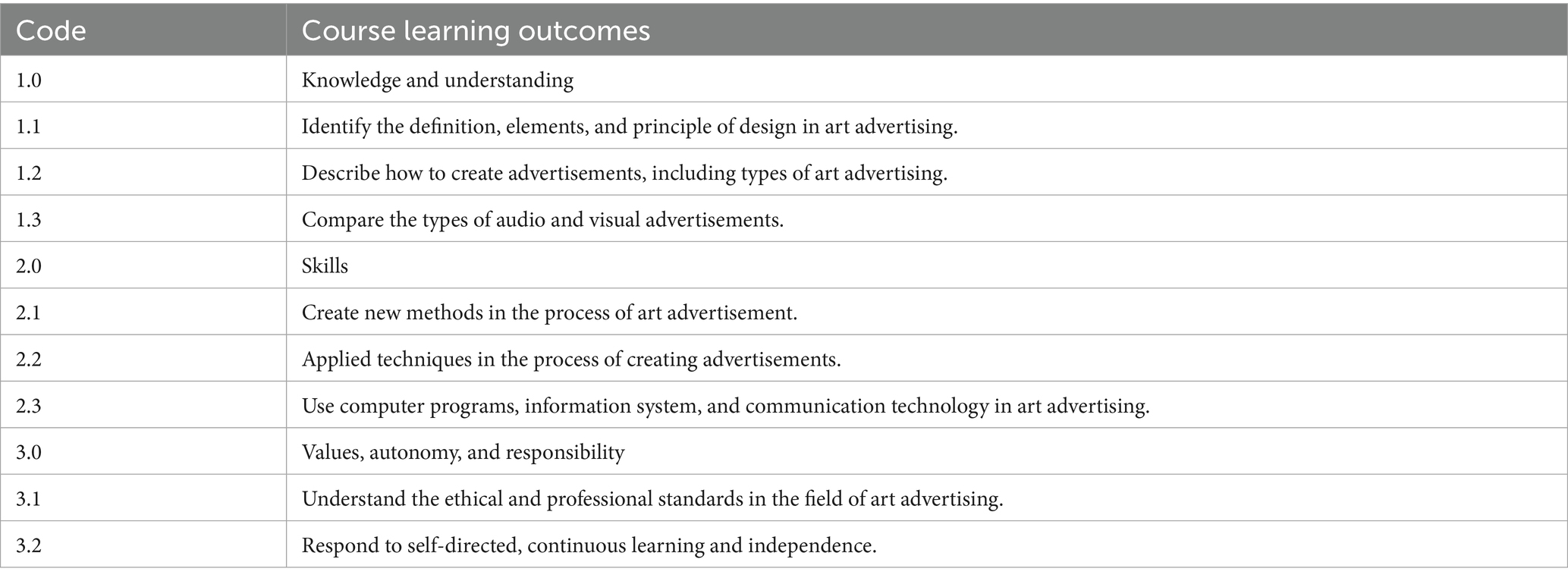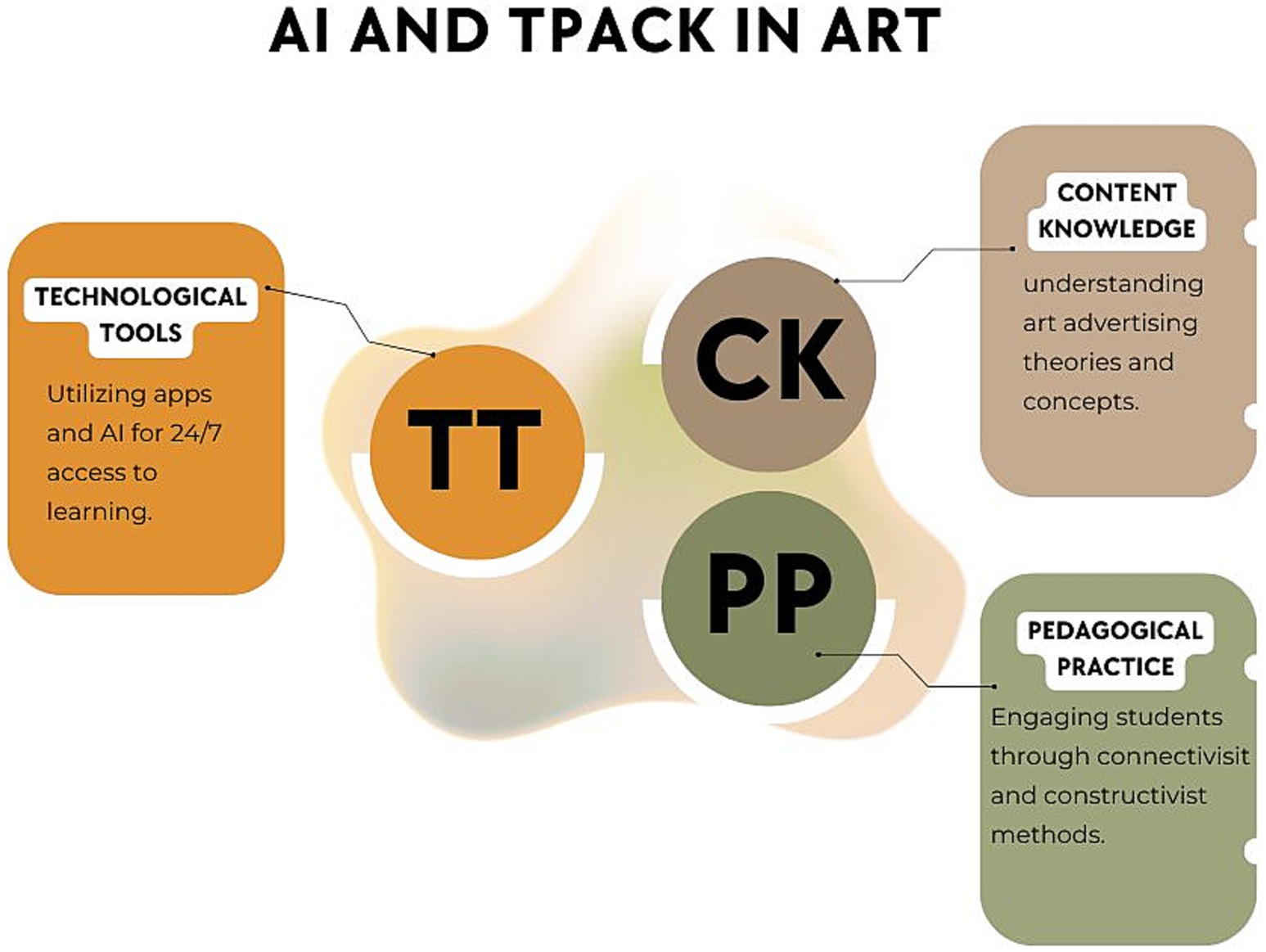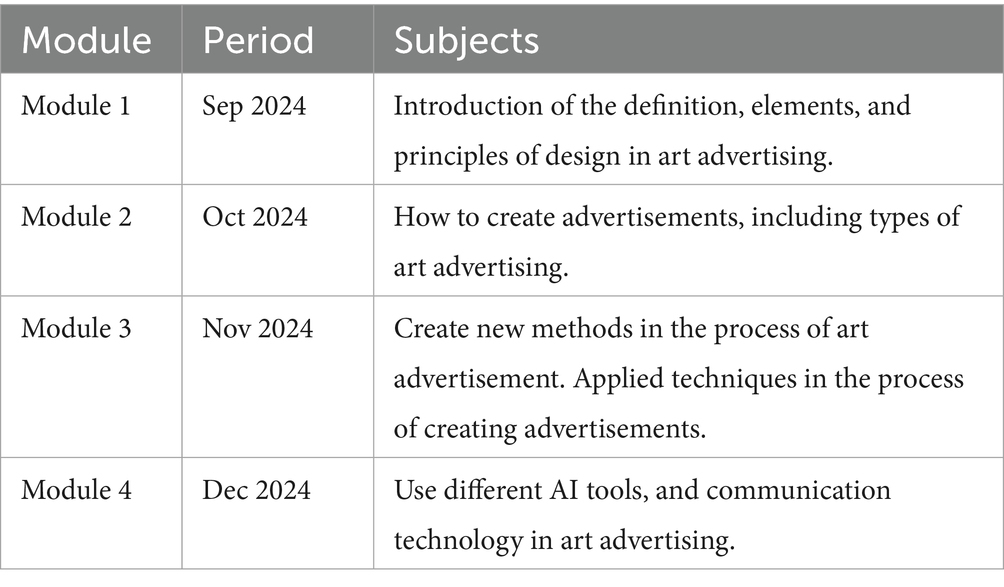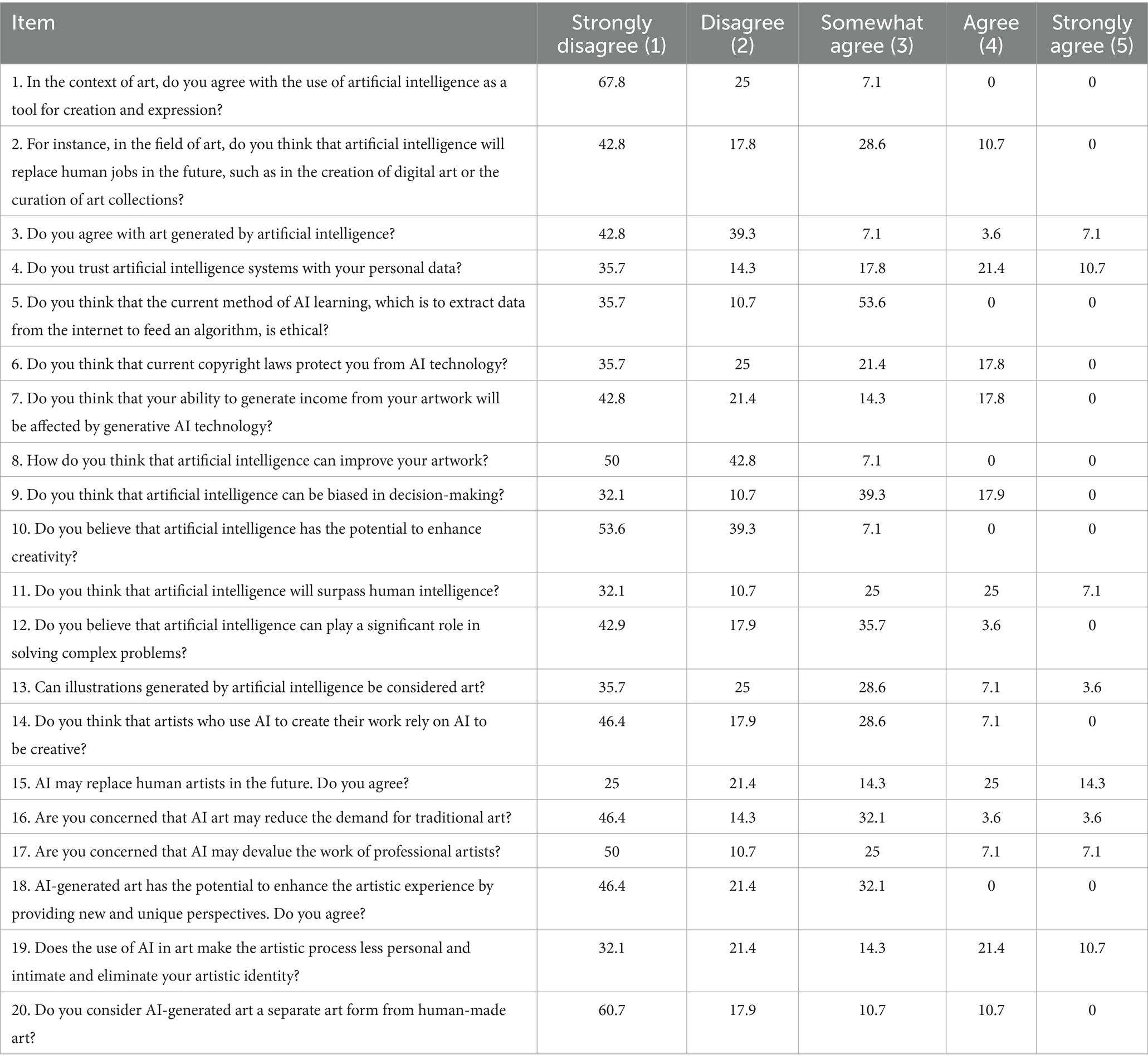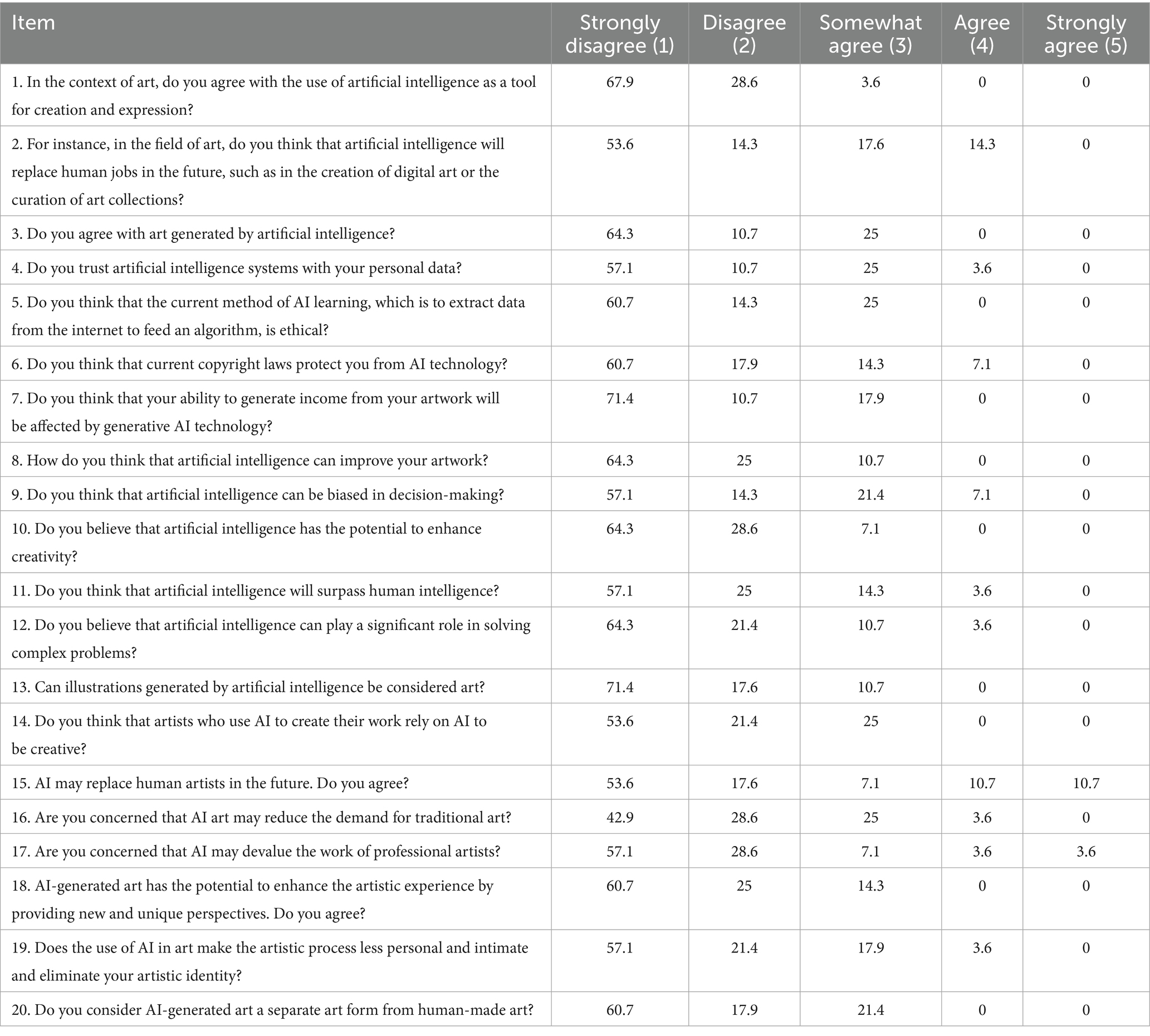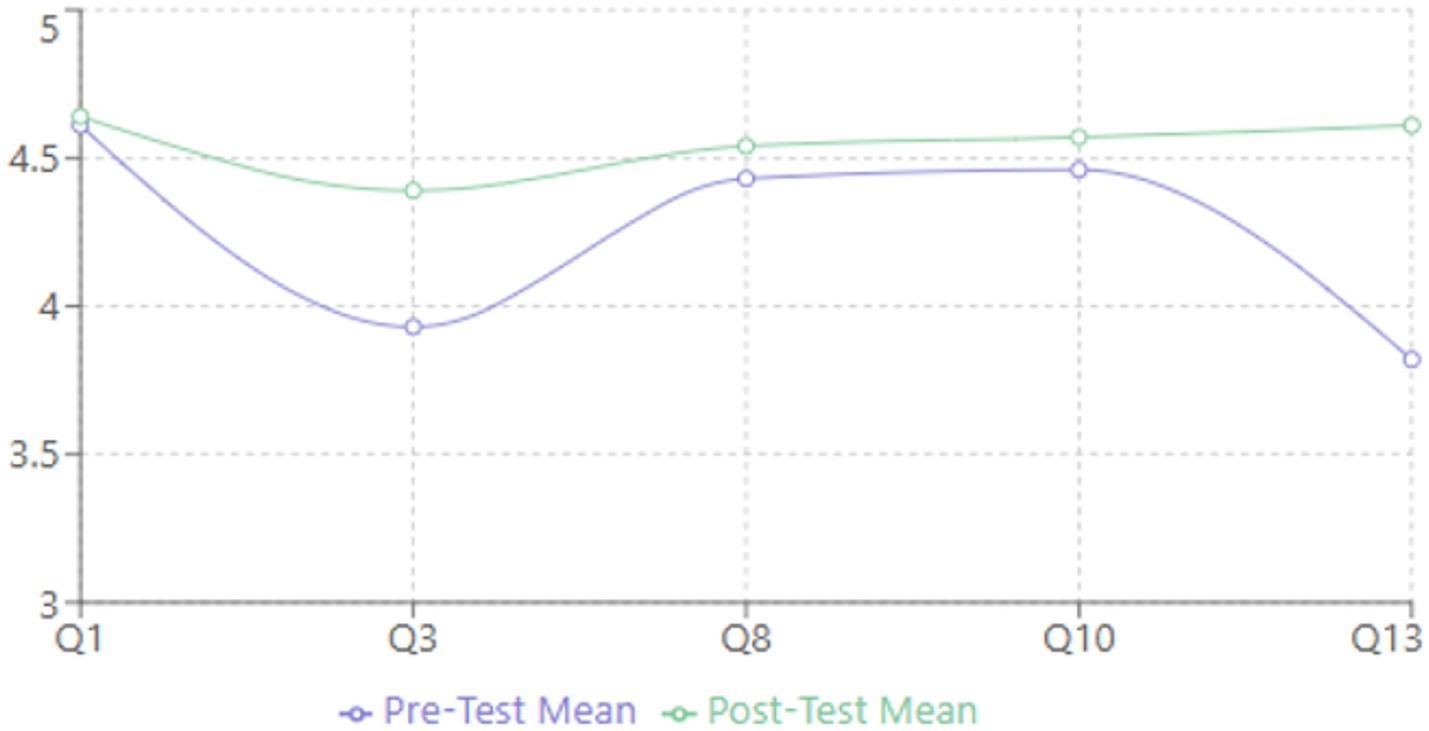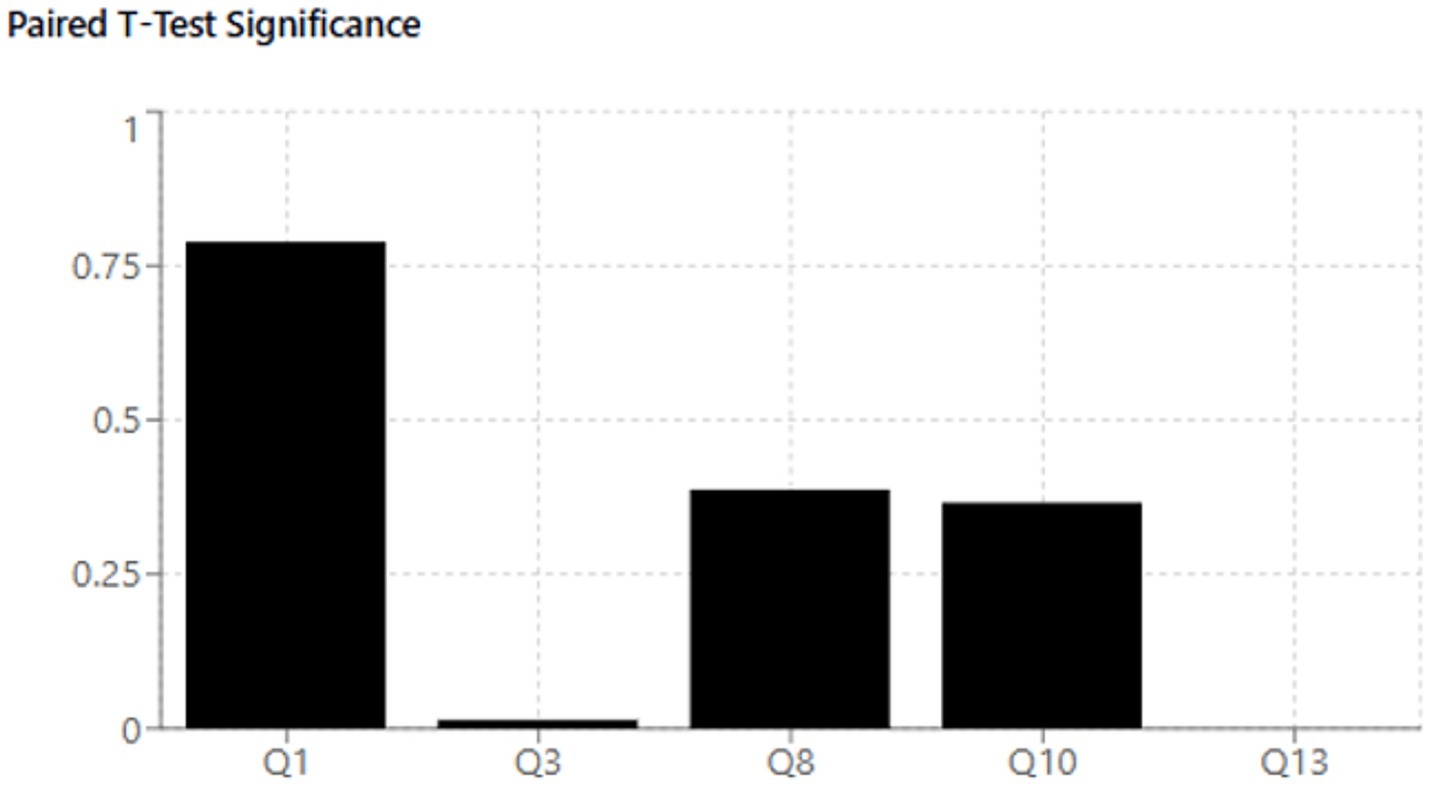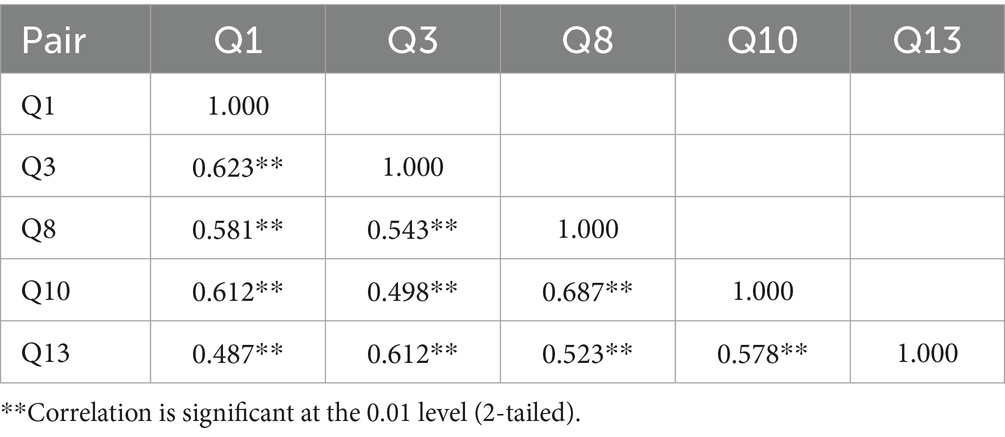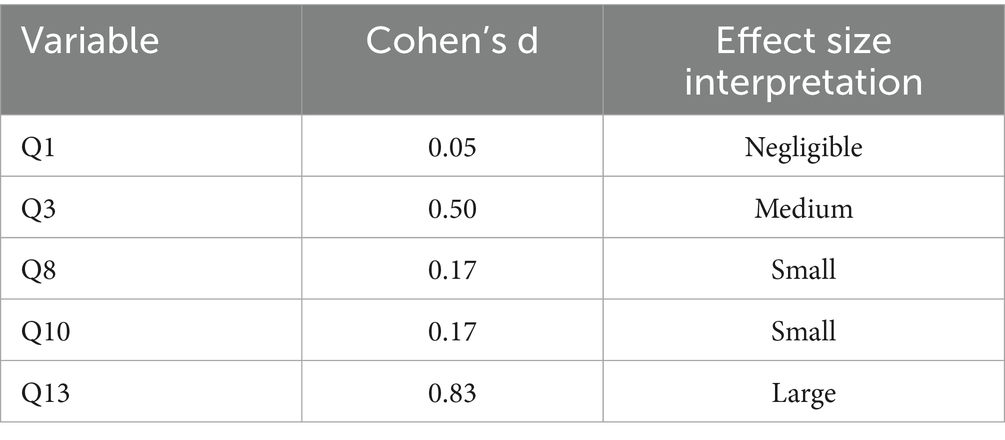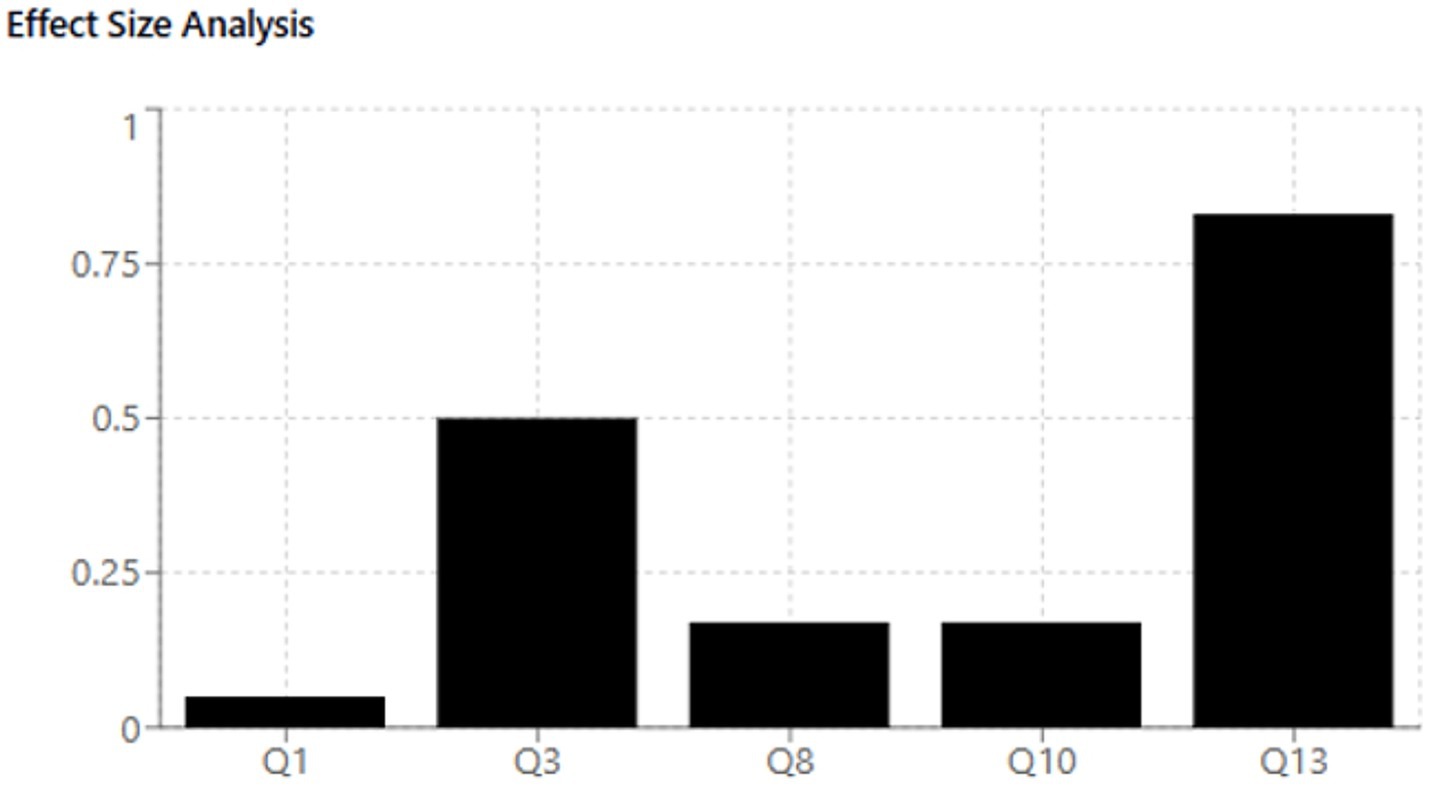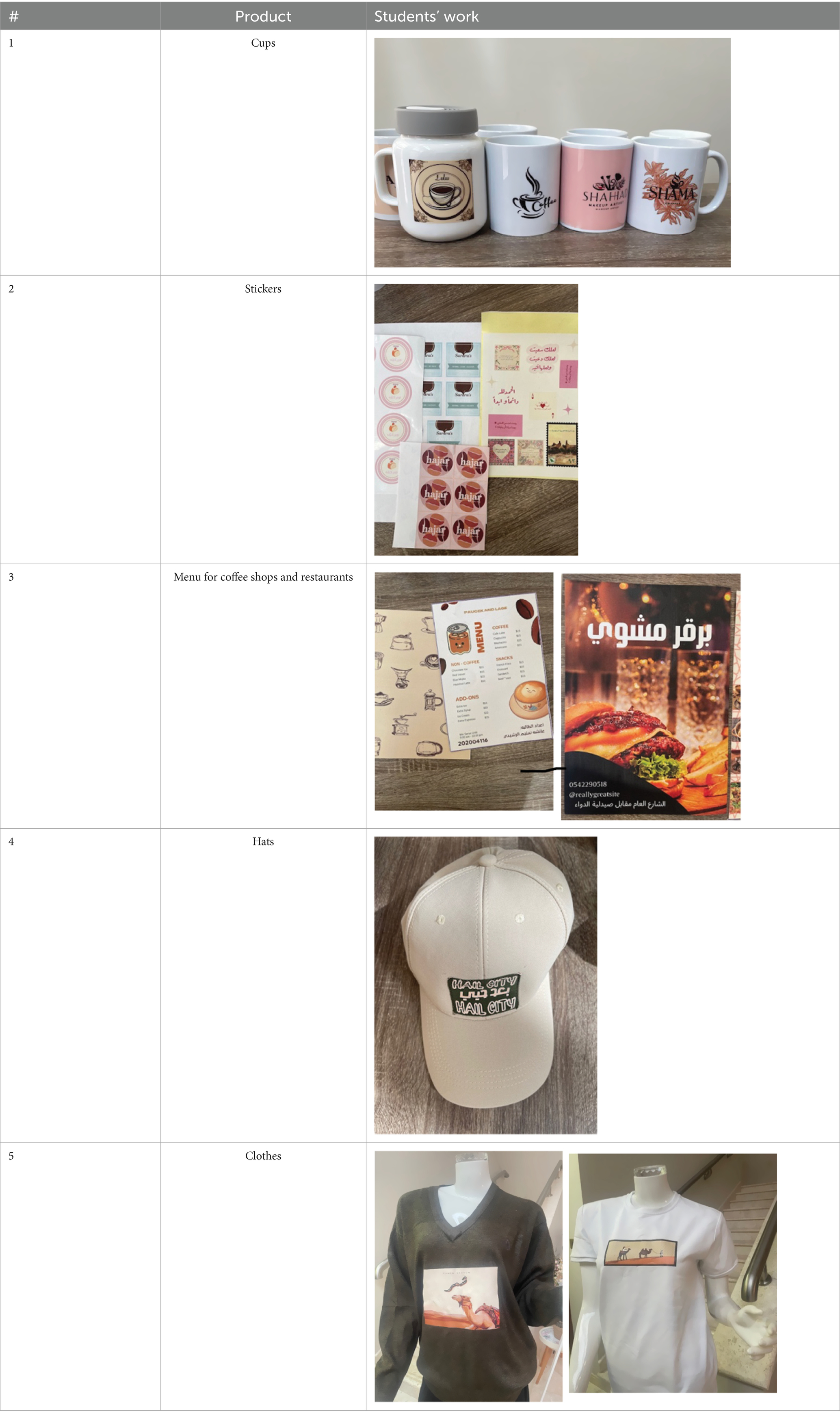- 1Department of Fine Arts, University College of Literature & Arts, of Ha’il, Ha’il, Saudi Arabia
- 2Department of Education, Institute X, Islamic University of Madinah, Madinah, Saudi Arabia
Introduction: The current study investigated how students use artificial intelligence (AI) tools to enhance their learning in course activities, focusing on an advertising art course in a fine arts bachelor’s program at a Saudi Arabian university in Fall 2024.
Methods: This study used the Saudi Artificial Intelligence in Digital Learning (AIDL) framework and Technological Pedagogical Content Knowledge (TPACK) model to design AI activities in art classrooms. The research examined students’ perspectives on AI activities used in the course and the impact of using AI as a technological tool. A mixed-methods pilot design was used to produce an in-depth description of a small group with a specific duration and location. The sample of participants was purposely chosen: 30 female undergraduate students who registered for the course. Data were collected through the syllabus, observation, a survey, pre-and post-course tests, focus group discussions, and document and artifact analyses.
Results: Six themes emerged from the data. AIDL was revealed to be valuable and AI tools were deemed helpful in teaching and learning art and design concepts. The researcher integrated AI into their curriculum to help students understand the course requirements and improve their learning.
Discussion: The results indicate that these tools empower students to discover their unique talents and refine their skills in the arts and that teachers should incorporate TPACK and AIDL into curricula. Additionally, the findings imply that utilizing AI tools is essential for transforming teaching and learning methodologies in not only art and design but also other subjects. Finally, it benefits students’ understanding of course requirements and helps teachers effectively organize their courses.
1 Introduction
Artificial intelligence (AI) is changing the landscape of various industries, including education. In art and design courses, AI has transformed some traditional teaching and learning methodologies by allowing educators to engage with students in ways previously unimaginable. AI capabilities extend beyond mere automation, enabling educators to inspire creativity, personalize learning, and provide on-the-spot feedback, which are all important in an education-based art environment. As art and design demand high levels of creativity and individuality, AI’s role in supporting these traits without stifling them profoundly interest educators and learners alike.
The most challenging issue for teachers is creating an effective plan for utilizing AI activities in their courses. Various factors contribute to the hesitation some teachers feel when it comes to incorporating AI activities into their classrooms. Teachers may avoid doing so for several reasons: (1) they may not be familiar with how to effectively integrate AI tools into their teaching practices; (2) they may believe that traditional teaching methods are more effective for certain subjects or skills and may prefer to adhere to those methods instead of introducing AI owing to concerns about the accuracy and reliability of AI-generated content; and (3) they may feel that AI activities can disrupt the flow of their lessons or cause distractions as introducing AI tools can require additional classroom-management strategies.
Contrarily, AI can enhance human creativity by acting as a collaborator instead of a replacement. This study aimed to design AI activities for an art classroom using the Saudi Artificial Intelligence in Digital Learning (AIDL) framework. Additionally, it explored students’ perspectives on AI activities used in art advertising course and the impact of using AI as a technology tool using Technological Pedagogical Content Knowledge (TPACK), which is a framework describing what knowledge teachers require to integrate technology into their teaching. TPACK is an emergent form of knowledge that extends beyond the three “core” components—content, pedagogy, and technology (TPACK, 2021). AI tools help teachers provide content to students, enabling them to hone their artistic skills. However, despite the increased support for AI tools, the concern that AI will replace human creativity persists.
This study aimed to apply the AIDL framework in teaching art and design and to establish a plan for using AI activities in an advertising art course of a fine arts bachelor’s program at a Saudi Arabian university in Fall 2024. The study also evaluated how students used AI tools to improve their learning and engage in activities. This study explores the various ways in which AI can support teachers in delivering more effective lessons and assist students in art and design classrooms to enhance their learning experience and creative output. The study addressed the following three research questions (RQs):
RQ1. How did an instructor design AI activities in an advertising art course aimed at using AI tools in the fine arts program?
RQ2. How did students evaluate the AI activities before and after completing the course?
RQ3. What were the students’ experiences and interactions with using AI tools in the advertising art course?
2 AI in the digital learning framework
The National eLearning Center in Saudi Arabia offers an AIDL framework including 9 dimensions and 22 sub-dimensions (Figure 1). Underlining the key principles critical to ensuring the responsible use of AI across all forms of learning, it aims to encourage educational institutions to consider adopting AI in digital learning. Every dimension outlined in the framework was developed to direct the activities of various educational institutions to help them effectively benefit from AI integration (National eLearning Center, 2023).
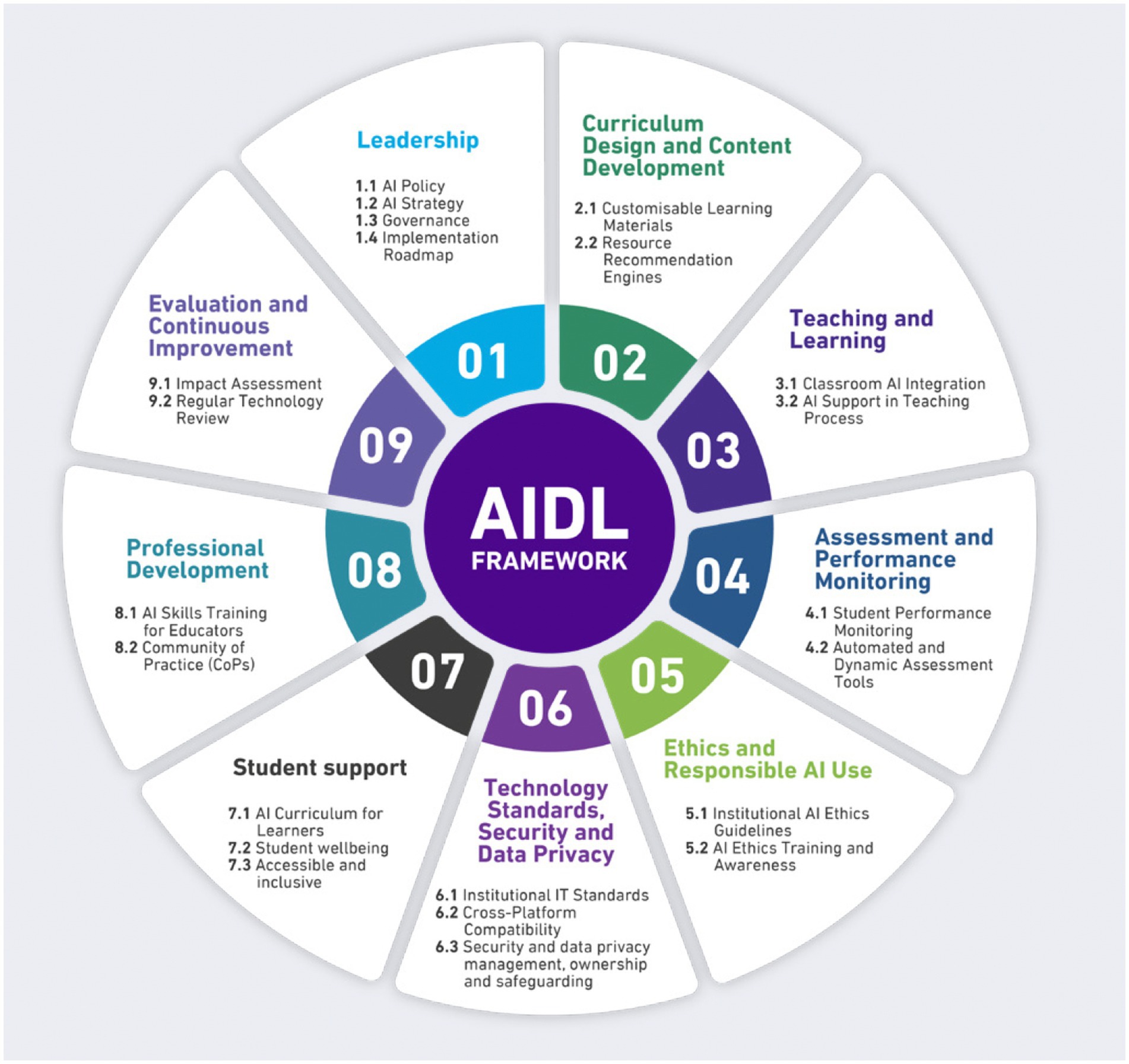
Figure 1. Artificial intelligence in digital learning (AIDL) framework (National eLearning Center, 2023).
AI systems are integrated into classrooms to enhance students’ teaching and learning experiences. AI can personalize learning, automate repetitive tasks, and provide real-time feedback, enabling educators to focus on more individualized instruction and support (National eLearning Center, 2023). Teaching and learning comprise Number (03) dimension in the AIDL framework, which includes two subdimensions: (1) classroom AI integration and (2) AI support in the teaching process.
3 Using constructivist and connectivism theories as the basis for TPACK
The TPACK framework extends Shulman (1986) concept of Pedagogical Content Knowledge and represents the blending of content and pedagogy within Connectivism and Constructivist theories into an understanding of how particular aspects of subject matter are organized, adapted, and represented for instruction. Pedagogical content knowledge, which deals with the teaching process, includes “the way of representing and formulating the subject that makes it comprehensible to others” (Shulman, 1986, p. 9). According to Koehler and Mishra (2009), “The TPACK framework for teacher knowledge is described in detail as a complex interaction among three bodies of knowledge: content, pedagogy, and technology” (p. 60). Additionally, Ross (2012) explained that the TPACK framework helps describe how technology aids educational systems in any subject. “Content Knowledge” comprises the educator’s knowledge of the subject to be taught or learned, which includes knowledge of ideas, theories, organizational frameworks, and concepts. “Pedagogical Knowledge” is an educator’s in-depth knowledge pertaining to practices, methods, or processes related to learning and teaching. These include the values, aims, and purposes of education. “Pedagogical Content Knowledge” (Figure 2) is similar to Pedagogical Knowledge and applies to the teaching of specific content. “Technological Knowledge” is dynamic and has no specific definition owing to its flux.
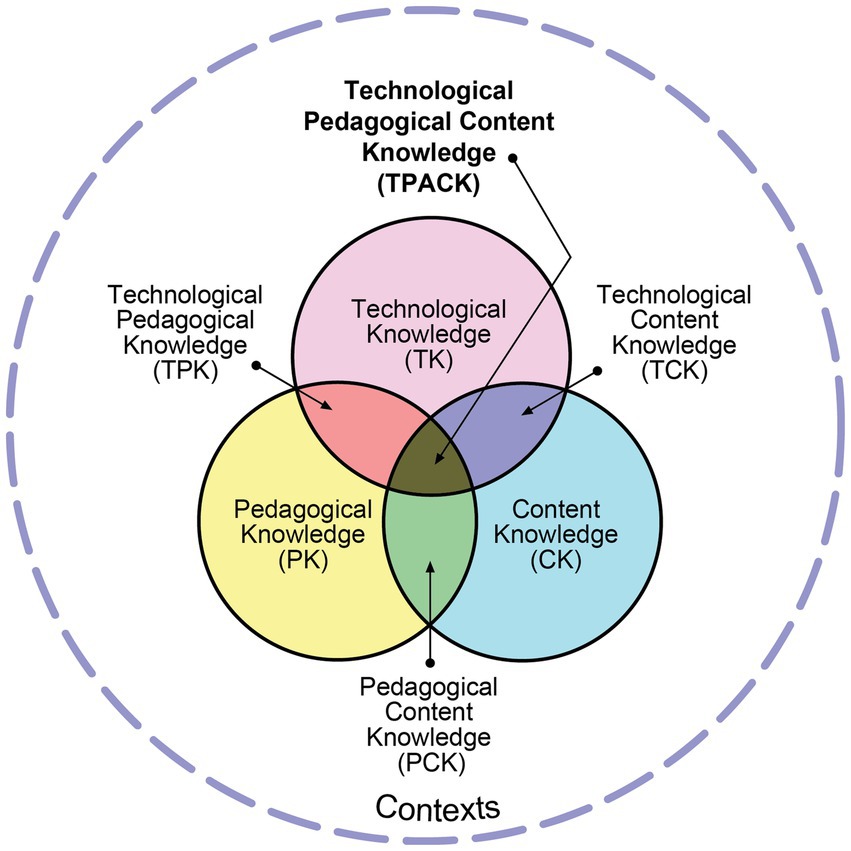
Figure 2. Technological pedagogical content knowledge (TPACK) framework and related components (TPACK, 2021).
A strong relationship exists between technology and content knowledge (Roth, 2001). Notable progress has been made in the realms of history, physics, medicine, and archeology, coinciding with the development of new technologies. This includes an understanding of how learning and teaching may vary with the application of a particular technological tool such as AI. Some learners may be aware of the constraints and pedagogical affordances of various technological tools.
4 Constructivist and connectivism theories
Constructivist theory is based on observations and scientific studies on how individuals learn. Factors identified in relation to how people acquire an understanding of the world include emotional, cognitive, environmental, and prior experiences. Technological tools assist teachers in delivering curricula to meet students’ learning needs. Constructivism describes how students process and reflect on their knowledge in an underlying social environment. Technology has reorganized how we live, communicate, and learn (Siemens, 2014), as well as transformed the instructional design used to improve learning and teaching. According to Johann Friedrich Herbart, a founding father of modern science pedagogy, technology supports a systematic approach to instruction (Manning and Johnson, 2011). Therefore, teachers must use technology tools in the context of instructional design so that they can match the technology tools to the pedagogy.
Papert’s constructivism is defined as “building knowledge structure” and “learning by making” (Papert and Harel, 1991, p. 1). Papert focuses on the art of learning through making. Students gain knowledge by cognitively constructing interactions with tools, people, and cultures. Some of the significant mediating factors comprise the affordance of learning tools, sociocultural environment, and learning environment (Ackermann, 2001). Fosnot and Perry (1996) described constructivism as cognitive development and deep understanding as the goal of instruction. Students understand this as the construction of active learner reorganization. Vygotsky (1978) pointed out that language helps construct meaning between individuals in an environment. A successful learning process is created through dialog and interaction within a group (Churcher, 2014). Jaramillo (1996) analyzed Vygotsky’s sociocultural theory of learning in education, which also examines how sociocultural theory impacts the teaching strategies and curricula of the constructivist movements.
Connectivism is a theoretical framework used to understand learning through technology. Students use technological tools to improve their learning network skills, use information resources, and collaborate and communicate with their communities. To summarize, connectivism theory conveys that people can find and connect with other people. Siemens (2014) pointed out that “connectivism presents a model of learning that acknowledges the tectonic shifts in society where learning is no longer an internal, individualistic activity. How people work and function is altered when new tools are utilized” (p. 7). Connectivism involves networking and social learning (Downes, 2007, as cited in Duke et al., 2013). It also facilitates learning by incorporating the values, beliefs, and principles discovered through networks, chaos, and self-standard theories (Duke et al., 2013).
Moreover, Siemens and Downes defined connectivism theory as a digital age theory, which entails the ability to discover thoughtful insights between sources and connect core existing skills and ideas to facilitate progressive learning (as cited in Duke et al., 2013). Connectivism is considered a learning process that explores networks; such a capacity enhances individuals’ ability to acquire knowledge that propels research and aids in the interpretation of patterns. Learning is defined by the concepts of behaviorism, constructivism, and cognitivism theoretical perspective (Duke et al., 2013). Thus, arts students connect technology to the learning process. This implies that students can use AI tools, social media, and upcoming websites, services, and blog platforms to expand their learning networks.
5 AI in curriculum enhancement and resource development
AI plays a leading role in enhancing the curriculum and developing complete learning resources for effective implementation in art and design education. Inspired by the trends in creative industries, AI algorithms can adapt and create curricula that provide students with relevant and current skills (Holmes and Tuomi, 2022). For example, AI can lead them to new modules or design techniques through which emerging digital movements in art can best be represented and thus keep their lessons up to date. Additionally, several AI-powered platforms, such as Canva and Fotor, have already made prepared design resources available to educators that can be adapted to various learning activities to help them provide informative and engaging lesson materials. AI may even recommend new ways to teach traditional subjects, such as augmented reality, to demonstrate perspectives or compositions (Li and Zhang, 2022). AI ensures that art and design students receive education that is creative and aligned with industry standards by updating the curriculum with newer tools and ideas. This will help bridge the gap between what academics do and the real-life application of the knowledge gained from education, making the curriculum more dynamic and relevant to students graduating from such courses.
6 AI for skill development through interactive learning platforms
Any course or learning process requires significant skill development. The subject of art and design is no exception, and its adoption of AI has been fundamental to enhancing the development of students through interactions and engagement (Chen et al., 2020). Engagement with peers and educators best positions students to develop their skills, especially due to the exchange of immense knowledge and information, which some students may have lacked before engaging with peers. Examples of platforms that employ AI to enhance skill development include SketchAR and Procreate, tutorial-guided websites through which students can obtain hands-on real-time practice for drawing, painting, and designing by following step-by-step instructions and online interactive lessons.
Another characteristic of AI in skill development is its capability to provide immediate feedback using AI tools, which is important for allowing students to monitor their skill-development processes (Li and Zhang, 2022). Information about developments made and areas of improvement allow students to monitor their skill development. In summary, the adoption and use of AI are fundamental to fostering an interactive and supportive learning environment that is essential for developing skills.
7 AI as a teaching assistant in art and design
AI has continuously revolutionized the role of art and design teachers by acting as a teaching assistant, enabling educators to concentrate on effective student engagement and providing more assistance to students requiring additional aid (Li and Zhang, 2022). Jun (2024) noted that AI is inspiring new forms of advertising design and encouraging advertising designers to enhance their digital creativity through advancements in science and technology. Consequently, higher education institutions are reevaluating how they educate advertising designers. In light of the evolving landscape of AI, these institutions are transitioning from traditional teaching methods to AI-driven models for training advertising professionals. Incorporating AI-powered teaching methods, commercial projects, innovative teaching tools, and the developing creative thinking skills for students are essential. The impact of digital transformation on enhancing professional competencies among advertising students highlights the integration of digital tools and AI into educational practices.
Focusing on the current context in Ukraine, Fayvishenko et al. (2024) explored how educational technologies—such as information and communication technologies, gaming, and practice-oriented approaches—are implemented within a competency-based framework. The findings emphasize the need for both students and educators to access technical resources and develop digital skills to effectively combine innovative methods with traditional teaching practices. The research demonstrates that utilizing digital tools and AI not only helps students acquire technical knowledge, but also enriches their understanding of the creative and strategic aspects of advertising work. This combined approach effectively prepares students for the dynamic field of marketing communications. While challenges related to accessibility and the development of digital skills remain, the benefits of digital transformation in promoting learning outcomes and professional readiness are significant.
AI may also add visuality and dynamic motion to lesson content and prepare teaching materials that would take far more time if teachers attempted it. AI does not replace the teacher but merely complements the teaching process by reducing teachers’ tasks to focus on creativity and individual attention. Ali (2024) investigated the attitudes of art education teachers toward the integration of AI in teaching visual arts at the general education levels in Saudi Arabia. The study involved a sample of 144 art education teachers. Utilizing a descriptive analytical approach, the research employed a meticulously developed questionnaire designed to assess the perspectives of art education teachers on the incorporation of AI in visual arts education. Challenges associated with the application of AI techniques were also acknowledged, reflected in an average score of 4.70.
Overall, the attitudes of art education teachers toward the use of AI in teaching visual arts were notably positive with an average rating of 4.39. Furthermore, the analysis revealed no statistically significant differences in the average attitudes of art education teachers toward the use of AI, regardless of gender, academic qualifications, or years of experience. AI platforms help organize lesson plans, create digital resources, and streamline the teaching process. They also automate numerous administrative tasks, such as grading and example generation, which allows teachers to invest their most valuable time in mentoring students and providing personalized feedback, thus encouraging creative development among students (Li and Zhang, 2022).
Based on the literature reviewed, we can infer that although several studies have discussed using AI in advertising, none have discussed the application of the AIDL framework and TPACK in teaching art and design. Thus, to the best of authors’ knowledge, no studies in Saudi Arabia have used the AIDL framework in designing or developing art courses or other subjects thus far. This study focused on different ways in which students can use AI tools in activities in the classroom using AI websites to enhance their learning. In December 2023, the AIDL framework encompassed a suite of guidelines that includes protocols, standards, and practices, all tailored to the unique requirements of all educational sectors in Saudi Arabia. It is structured to deliver concrete steps and methodologies for AI integration, ensuring that schools, universities, and training institutions can navigate the transition to AI effectively and implement it ethically and responsibly. The current study offers critical guidance for instructors on how to use AI activities when planning their course on any subjects with the AIDL framework and TPACK. Simultaneously, it aims to help educators understand students’ needs to assist them in their educational journey.
8 Methods
8.1 Study design
This study adopted a mixed-method approach, that is, it combined qualitative and quantitative elements in a pilot study. Data were collected through a course syllabus, a survey, pre-and post-course tests, a focus group discussion (FGD), documents, and artifacts. The sample was purposely chosen and included 30 female undergraduate students who had registered in an advertising art course. The study comprised a face-to-face course which included only female students on campus. The study was conducted from August 18 to December 14, 2024, which comprised one semester on the main campus for female students in the Department of Fine Arts at a university in Saudi Arabia. The case study examined the outcomes of using AI as a technological tool that upgraded art and design teaching and learning using the AIDL framework. Data were collected from various sources, including a pre-course survey, pre-course test, and post-course test for each focus group.
8.2 Participant demographics
In 2024, 30 female undergraduate students from the fine arts department were enrolled in a face-to-face (F2F) course. A pre-course survey collected demographic data, including the participants’ sex, age, and level of undergraduate education. Two participants withdrew from the study, and their data were excluded from analysis. All participants were female, aged 18–34 years, and of Saudi nationality. Of these, 7.1% were freshmen, 10.7% sophomores, 7.1% juniors, and 75.1% seniors (Table 1).
8.3 Qualitative data collection
8.3.1 The course syllabus
The course syllabus was built using the form required by the National Commission for Academic Accreditation and Assessment for academic programs, quality assurance, and academic accreditation standards in Saudi Arabia (Education and Training Evaluation Commission (ETEC), 2021). The researcher devised teaching strategies and activities with specific learning objectives for art advertising courses. Table 2 presents the course learning outcomes of teaching strategies and assessment methods.
8.3.2 Observation
The observation component entailed systematic documentation of a phenomenon within the art and design sector through a technological lens. A total of 23 class sessions were observed, with each session lasting no longer than 3 h. The instructor facilitated the course while simultaneously observing student behavior and communication, as well as attending to their engagement in projects. The researcher utilized the Art and Design Lesson Observation Form during the course, which consists of essential inquiries related to the learning processes in art and technology analysis for each session (Edge Hill University, 2024).
8.3.3 Focus groups
FGDs were utilized to collect information from the participants via F2F interviewing and dissection after completing the course. A group of 28 students was divided into five smaller focus groups. The FGDs were designed to answer RQ3 with four interview questions: (1) Based on your experiences and interactions in the Advertising Art course, what are the benefits of using AI tools?; (2) Do the AI tools help you with personalized learning? If so, how?; (3) Are AI tools considered a source of creative inspiration?; and (4) Do you think AI tools help you collaborate in group work? The FGDs were audio-recorded and the recordings transcribed to produce a typed copy for coding.
8.3.4 Documents and artifacts
The documents and artifacts included other primary sources of qualitative data. The documents encompassed an assortment of written records, visual data, artifacts, and archival data. Data from documents and artifacts included visual documents such as letters, videos, drawings, web-based media, and photography.
8.4 Quantitative data collection
8.4.1 Pre-survey
The survey collected demographic data—including sex, age, and level of undergraduate education—to provide the researcher with participants’ background information before the study began. The researcher used Google Forms to send an online link to participants with questions related to demographics.
8.4.2 Pre-and post-course tests
Pre-and post-course tests were used to collect participants’ information using questionnaires. A pre-course test of 20 questions related to the use of AI in the classroom was taken by the 28 students before the course began. After they had completed the course using AI, the focus group of the same 28 students took a post-course test with the same questions. Both tests included close-ended questions about their knowledge of AI and its ethical implications and the impact of AI applications in art.
8.5 Data analysis
8.5.1 Statistical analysis
SPSS Statistics 30.0. was used for data analysis. Survey and pre-and post-course tests were first transcribed into Arabic—the students’ native language; thereafter, the transcripts were translated into English along with the field notes. The questions were answered on a 5-point Likert scale (where, 5 = strongly agree, 4 = agree, 3 = somewhat agree, 2 = disagree, and 1 = strongly disagree). The scores for the participants in each group were then summed, and a paired t-test was performed.
8.5.2 Thematic analysis
The researcher used MAXQDA, a software program, for analyzing observations, focus groups, and documents and artifacts data. The data and information obtained from the observations were processed using thematic analysis through coding and identification of themes in participants’ responses to the research questions.
8.6 Ethics statement
Prior to submitting the Research Ethics Committee form at the University of Ha’il, the researchers obtained approval from the Fine Arts Department for conducting research within the classroom setting. Participants provided informed consent prior to the commencement of the study, which detailed the research objectives and activities occurring during the course. The researchers collected signed consent forms from students who were willing to attend a meeting, during which the study was discussed, potential risks and benefits were elucidated, data collection methods were explained, and the time commitment required for participation was outlined. Participation in this research was entirely voluntary. Participants retained the right to decline participation or withdraw from the study at any stage without forfeiting any benefits to which they are otherwise entitled. The signed consent forms are securely stored in a locked cabinet within the university office, and, in compliance with university research protocols, they will be shredded after a period of 2 years. This study was reviewed and approved by the Research Ethics Committee of University of Ha’il (Research No. H-2025-663).
9 Results
9.1 Theme 1: integrate AI activities into the classroom using the Saudi AIDL framework in teaching and learning
This study focused on teaching and learning the AIDL framework in the third dimension, which included two sub-dimensions: Classroom AI integration and AI support in the teaching process (National eLearning Center, 2023). Thus, this study adopted AI in digital learning in the classroom using the TPACK model (Figure 3).
TPACK helps art instructors guide students in constructing ideas. The researcher used three bodies of knowledge from TPACK to teach courses: content, pedagogy, and technology. Content knowledge is the information that the instructor teaches students; consequently, students are expected to learn the presented material. The content of this course was art and advertising knowledge in a specific academic sense, including facts, theories, principles, and concepts. Pedagogy, the theoretical grounding of teaching practice, informs classroom practice and provides a context for instructors to use their content knowledge to design and deliver a curriculum. Connectivism and constructivist theories assist instructors in successfully designing learning experiences that engage students in the arts, enabling classrooms to provide learning activities that invite student engagement and participation. Technology, the final domain needed to create a connected environment, utilizes tools such as apps, websites, social media, and AI intelligence that support student learning both inside the traditional classroom and outside the classroom in virtual learning spaces. These tools extend the classroom environment to virtual learning spaces, providing students with 24/7 access to content.
This study employed connectivism theory to enhance the learning experiences of art advertising students. Students used technology tools to improve their learning network skills, access information resources, and most importantly, to collaborate and communicate with their community and classmates. The use of AI tools fosters a sense of community among art students as they engage in collaborative activities and social learning concepts. The notion of constructivism posits that students create knowledge by creating meaning in the learning opportunities presented to them. Hence, the AI tool, a technological component of TPACK, is an excellent example of how constructivist theories work. It offers a platform where students can interact, create online content, become engaged in it, and deliver the results of ads.
9.1.1 Advertising art development course
Classroom AI integration refers to the implementation of AI tools and technologies to enhance the teaching and learning processes. AI can be integrated into various classroom methods to personalize learning, automate repetitive tasks, provide real-time feedback, and act as AI-assisted grading tools (National eLearning Center, 2023). In the current research, teachers integrated AI activities in the three-credit F2F “Art Advertising” course, which began in Fall 2024, and included activities in flipped online instruction using the Blackboard in the Learning Management System (LMS) and other AI tools, including social media tools such as Pinterest, TikTok, Telegram, and YouTube. F2F meetings were held twice a week for lectures and labs. At each F2F meeting, meeting times, class activities, learning objectives, competencies, and outcomes were discussed. The modules contained instructions, materials, and work or assignments that students had to submit online before the F2F meetings.
This study focused on teaching and learning the AIDL framework that adopted AI in digital learning in the classroom using the TPACK model. The instructor used different AI tools introduced in the course, which assigned classwork and homework to students and reviewed their submissions in real time, either from a desktop or mobile device, offering a convenient way to assess their knowledge. The researcher updated teaching strategies by integrating one AI activity into each unit of the course. Thus, the required materials—such as the syllabus, required text, note-taking, and laboratory exercises—used desk computers, laptops, iPads, or smartphones. Table 3 presents how the researcher set the schedule for the teaching modules with different subjects during the course.
9.1.2 Course description
The course explored the elements of advertising design in posters, logos, billboards, and media. Students determined the advertisements and discussed the role of art in these messages. The course focuses on how to integrate technology tools into fine arts courses with regard to the art of advertising, which will help produce artistic works and express the real and visual reality in which learners live, especially because of an immense technological revolution, wherein advertising is an important daily component of learners’ visual production.
9.1.3 Lesson planning
The educator uses AI tools to help analyze individual student performance data and generate lesson plans that target specific learning gaps, suggest creative approaches for engagement and differentiation, and adjust teaching strategies to suit various learning challenges and needs. Additionally, stating the allocated time for the activity and at what time it should transpire is vital; teachers should also employ relevant techniques to motivate their learners. Creating a good rapport facilitates teachers’ understanding of students’ needs. After identifying the time, location, and length of the project, designers must choose appropriate digital tools and resources for demonstration (Kali et al., 2011). Undoubtedly, integrating technology adds value to the students’ learning experience.
The instructor used four stages of AI activities: engaging, building, applying, and reflecting. According to the AIDL framework, AI supported the teaching processes. The application of AI tools to assist educators in material generation, lesson planning, and content curation can be tailored to diverse student learning styles. This sub-dimension focuses on how AI streamlines and enhances the teaching process. AI tools can automatically generate learning materials, assist in creating comprehensive and diverse lesson plans, and curate content to meet students’ varied learning preferences, thus improving their overall instructional efficacy (National eLearning Center, 2023).
Activity 1: The Process (Table 4)
• The teacher divided the students into groups. Each group included five students and had a leader.
• The teacher provided students with the link to the Mywhiteboard website: https://www.mywhiteboard.ai/.
• The teacher provided each group with a YouTube video to match one objective of the classroom lesson.
• Students uploaded the video to the AI tool and watched it.
• After watching the video, students summarized the video created using the AI tool.
• Students answered the questions that the AI tool created.
• Students shared the board with the teacher for feedback.
Activity 2: The Process (Table 5)
• The teacher asked the students to prepare questions for their peers on one of the course topics.
• The teacher provided the students with the lesson objectives.
• The teacher asked the students to go to the Questionwell website via the link: https://questionwell.org/.
• The students created a user account.
• Each student played an active role in the process, writing the topic, choosing the test type, entering lesson objectives, and initiating question generation by clicking a button.
• Students reviewed the generated questions and the correctness of the answers.
• In the spirit of collaboration, the teacher divided the students into pairs, encouraged them to test their colleagues, and set a time for them to do so; each student took on the responsibility of providing constructive feedback on their colleague’s test, recognizing the valuable learning opportunity in doing so.
Activity 3: The Process (Table 6)
• The teacher determined the lesson to be explained to each student and provided each with teaching instructions.
• Students went to the Schemely website via the link: https://schemely.app/.
• Each student created a user account.
• Each student wrote the lesson title, age group, and course name on the Generate button.
• Students watched the presentation, lesson objectives, and interactive activities.
• Each student verified the correctness and accuracy of the outputs and made the modifications.
• In the classroom, students played the role of teachers and explained the lesson to their colleagues.
• Students evaluated their colleagues and received feedback.
• The teacher provided feedback to the young teacher.
Activity 4: The Process (Table 7)
• The teacher asked the students to create stickers for their graduation parties, including their names and years.
• The teacher provided students with the Picsart AI website link via https://picsart.com/.
• Students designed their stickers, and AI helped them create different ideas for graduation stickers.
• The teacher asked them to print their stickers on a piece of paper.
Activity 5: The Process (Table 8)
• The teacher asked students to create logs for their company, such as “What is the name of your company?” “Pick a color set.” “Tell us about your business.”
• The teacher provided the students with the Picsart AI website link: https://picsart.com/.
• Students embarked on their logo-design journey using innovative AI technology at their side. AI helped them explore a variety of design ideas, and they had the exciting task of choosing the ideas that best represented their company.
• The teacher instructed the students to apply their logos to a product, demonstrating how these would appear in the real world.
• The students decided to use their company name as a logo for their cup products, establishing personal connections to their brand.
Activity 6: The Process (Table 9)
• The teacher divided students into working groups.
• Students nominated a leader for their group.
• Each group chose a research topic on the art of advertising.
• The teacher provided students with the link to the Elicit website: https://elicit.com/.
• Students searched for references related to the topic.
• Students compared their references regarding the goal, methodology, and results.
• The teacher set a time to complete the task.
• The group leader presented the results to the rest of the group and teachers.
• The remaining groups discussed with the team, asked questions, and provided feedback.
• The teacher provided input to the groups.
Activity 7: The Process (Table 10)
• The teacher then divided the students into groups. Each group included five students and had a leader.
• The teacher gave each group one objective of the lesson in the classroom.
• The teacher required an AI presentation for each group, which matched their objective.
• The group created an AI presentation by using Gama,1 and the leader of each group presented it for 2 min.
• The teacher asked students to evaluate other groups’ presentations using technology tools.
• The teacher evaluated each group.
• Students fixed their presentation after receiving feedback from the teacher and other groups.
9.2 Theme 2. Students’ evaluation of the impact of integrating AI in advertising art
The pre-and post-course test consisted of 20 questions. The response percentages of the 28 participants for the pre-course test are presented in Table 11, and those for the post- course test are shown in Table 12.
9.2.1 Descriptive statistics report
The descriptive statistics demonstrate small changes in the mean scores for five pre-and post-course test questions: 1, 3, 8, 10, and 13. In general, the mean of most questions was moderately higher, and the mean of Q13 showed the greatest improvement from 3.82 to 4.61. Standard deviations ranged between 0.56 and 1.12, indicating variability in participant responses. The sample size remained consistent for 28 participants with the standard error indicating that it remained relatively stable. The pre-and post-course test mean suggested a potentially positive trend in the measured construct, although the magnitude of change varied across different questions (Table 13). Figure 4 presents the different means in the pre-and post-course test.
9.2.2 Paired samples T-test report
The t-test analysis identified statistically significant changes for two questions. This correlation was established in Q3, with a statistical significance of p = 0.014, and Q13, with a statistical significance of p = 0.000. In this case, the mean of the difference was −0.79, which demonstrated a positive improvement in the ability of the school to meet the needs of the students as presented in Q13. The remaining questions (Q1, Q8, and Q10) did not exhibit statistically significant differences.
The negative mean differences suggest overall improvements in scores from pre- to post-course tests. The degrees of freedom remained constant at 27, with varying t-values reflecting differential impacts across questions. These results suggest that the intervention targets specific aspects of the measured construct (Table 14; Figure 5).
9.2.3 Reliability analysis report
Reliability analysis demonstrated strong internal consistency across the 20-item scale with Cronbach’s alpha increasing from 0.837 on the pre-course test to 0.892 on the post-course test. This improvement indicates enhanced reliability of the measurement instrument after the intervention. The alpha values indicated good internal consistency because they were well above the commonly accepted threshold of 0.7. However, based on the aforementioned analysis, an improved Cronbach’s alpha means that after the intervention, measured items became more related to the overall construct, which could imply that the items measured the construct more accurately or the construct was better defined (Table 15).
9.2.4 Correlation matrix report
The correlation matrix for the pre-course test showed that all questions in the study were significantly related (p < 0.01). Pearson’s correlation coefficients were between 0.487 and 0.687, indicating that the relationship between the variables was moderately to strongly positive. The highest coefficient of correlation was obtained between the Q8 and Q10 coordinates and the lowest was obtained between the Q1 and Q13 coordinates. These correlations indicate that the measured variables may be dependent, meaning that a change in one of the questions may be accompanied by a change in the other questions. The consistent statistical significance at the 0.01 level underscores the robust relationships within the dataset (Table 16).
9.2.5 Normality and effect size report
Crunched Kolmogorov–Smirnov and Shapiro–Wilk test coefficients for pre-and post-course test scores were p > 0.05; hence, the data collected were normally distributed, and the Stats test of a parametric nature could be used. The effect size was again variable and varied from Q13 with the highest effect size of 0.83, Q3 with a moderate effect size of 0.50, to Q1, Q8, and Q10 with the smallest effect size of 0.17. This indicates that the intervention had substantially different effects across the measured dimensions with some areas experiencing more pronounced changes than others (Table 17).
9.2.6 Effect size analysis report
Effect size analysis revealed significant variability in the intervention impact across different questions. Q13 demonstrated the most substantial effect with a large Cohen’s d value of 0.83, indicating a profound change. Q3 showed a moderate effect (d = 0.50), indicating significant improvement. Q8 and Q10 exhibited small effects (d = 0.17), representing minimal change. Q1 displayed a negligible effect (d = 0.05), indicating virtually no impact of the intervention.
These findings suggest that the intervention was differentially effective with some dimensions experiencing substantial transformation while others remained relatively stable. The varying effect sizes highlighted the nuanced nature of the intervention’s influence, emphasizing the importance of targeted and specific approaches in achieving meaningful outcomes (Table 18; Figure 6).
9.3 Theme 3: the benefits of using AI tools from the students’ experiences and interactions in the advertising art course
Students gained knowledge on how to use AI in the course and the experience of using AI activities to create their product designs. The researcher provided students with different assignments to participate in AI activities, such as peer, individual, and group projects to create designs and products for advertising art. Creating a realistic lesson plan that states the objective of the lesson is crucial for teachers (Mishra and Koehler, 2006). Notably, the skills that the novices should accomplish should be done so by the end of the project.
After ascertaining the goals of the lesson, considering the classroom environment to determine whether it was suitable for the experiment was imperative. Teachers must conspicuously consider factors such as the size of the class, arrangement of seats, and availability of digital tools and resources for the practice (Davis et al., 2011). Students chose one design or logo to print on their favorite product, such as cups, stickers, menus for a coffee shop or restaurant, T-shirts, and hats (presented in Table 19). Students created successful products by the end of the course. Undoubtedly, integrating technology added value to the students’ learning experience.
9.3.1 Engagement and enjoyable learning
During the focus group interviews, the researcher asked participants the first interview question: “Based on your experiences and interactions in the ‘Advertising Art’ course, what are the benefits of using AI tools?” After completing the course, a few students in the groups disagreed about using AI in their artwork: “I am concerned about someone stealing my artwork,” “But what if AI shares my design with other people,” or “I am afraid that I will lose my identity as an artist.” In contrast, more students in other groups expressed the benefits of using AI tools, such as Mywhiteboard, Questionwell, Schemely, Picsart, Canva, Elicit, and Gamma, in the course: “AI tools are fun and exciting,” “Easy to use,” “Save my time,” “AI tools give me new ideas,” “I am surprised to see the different ways AI can generate my text idea.”
Grájeda et al. (2024) found that AI-enhanced classes generated more positive emotions, such as joy and surprise, compared to traditional teaching methods. To confirm the significance of these differences, statistical analyses—including Pearson’s correlation, Student’s t-test, and the Kruskal–Wallis test—were conducted. This comprehensive approach provides valuable insights into the advantages and challenges of integrating AI into arts education. The study underscores AI’s potential to improve educational experiences and emotional engagement, while also highlighting the necessity for ongoing training and addressing ethical concerns to ensure effective and equitable use of AI tools.
9.3.2 Personalized learning
During the focus group interview, the researcher asked, “Did the AI tools help you with personalized learning? If so, how?” Students expressed that some AI-driven learning platforms, such as Elicit, with its innovative research, helped hem search faster and more effective ways to establish personalized individual learning trajectories by adapting course materials and modulating difficulty based on student progress. Similarly, tools such as Canva and Picsart enabled learners to explore augmented reality artworks at a pace uniquely suited to them, providing a scaffolded learning experience that evolves as learners advance.
Personalized learning is a treasured benefit of using AI in education, especially in the field of art and design (Li and Zhang, 2022). This is important in art and design classrooms, where students may have variable experiences with tools and techniques. AI provides real-time insights into the strengths of students and what they need to work on, allowing them to go at their own pace and further develop their skills (Ng et al., 2023). Because AI allows for customization in learning, greater inclusivity and support can be provided in a learning environment where students can creatively flourish regardless of their starting point.
The current research exhibited archetypal communication skills because both fields require practical demonstrations. Competency, innovation, and passion define art students; therefore, students are inspired to nurture their talents. Two groups agreed and mentioned that Canva AI was free and easier to access than Picsart. They discussed that Canva AI generated text for images with different options. The “Select style” and “Select aspect ratio” helped them describe their design. When they created their designs in Canva through “Dream Lab,” it helped them with different questions and options. For a question under “Make an Image” in Dream Lab—“What will you image today?”—one student group responded, “I answered the question by describing my idea in detail to get effective results when I generated text for the image.”
However, the other three groups liked Picsart more than Canva but needed to pay first. One student said, “Picsart has more options than Canva, but it is not free.” Another student said, “I like Picsart because this tool asked me different questions to organize my logo idea.”
According to the website, it asks questions such as:
• What is your company name?
• Pick a color set.
• Like any of these examples?
• Tell us a little about your business.
• Describe your ideal logo.
9.3.3 AI as a source of creative inspiration
During the focus groups interview, the researcher asked, “Do you consider AI tools as a source of creative inspiration?” AI is used not only for mere analysis or personalization in art and design but also as a strong creative trigger for inspiration among students (Zhao et al., 2024). Picsart AI and Canva AI have been designed to stretch the boundaries of creativity further by generating text to images that students themselves probably never dreamt of. These AI platforms use machine learning to consolidate various artistic elements. The resulting piece of art is often surreal, abstract, or experimental, provoking new ideas in the minds of viewers and students.
As students enter this realm with AI-generated art, they encounter new combinations of forms, colors, and compositions that help break conventional ways of thinking. AI makes designs more random and diverse, eradicating human bias and generalized notions of what beauty should look or feel like (Ng et al., 2023). Students can venture into paths that they may not have considered. Such exposure widens the scope of creativity and experimentation. Through sources of creativity, AI spurs students to think out of the box, expand their artistic capability, and explore unconventional methods of art. This generally encompasses brainstorming, sketching, and feedback, all quite effectively managed with the help of these AI tools. By allowing virtual workspaces that enable smooth and effective interactions, AI can help students combine talent and ideas with improved creative synergy (Li and Zhang, 2022). However, a few students were concerned about AI replacing human jobs in the future, personal data, and protecting artist creators.
9.3.4 AI tools as collaborative for groups
During the focus groups interview, the researcher asked, “Do you think AI tools help you collaborate in group work?” Knowing how to collaborate in a team is an important competency in art and design. From a group perspective, AI tools have transformed group collaboration into something more dynamic and effective than ever (Ng et al., 2023). All groups agreed that they had learned something from each other while discussing group strategies during the activity when they used the Mywhiteboard AI tool. Each group uploaded the video, watched it, and summarized it using the AI tool. They then collaborated to answer the questions that the AI tool created for them and shared their results on the board for the teacher and other groups to provide feedback. All groups agreed that the AI tools were easy to use and fast, provided different design options, and inspired them to work more. Gamma was another example of AI-powered platforms that improve collaboration by providing one virtual space to which all students can contribute simultaneously.
Moreover, such platforms use AI to predict group behavior with suggestions for improvement, thus keeping track of each member’s contribution toward maintaining balanced and productive group dynamics. The group had a discussion when they created an AI presentation in Gamma, after which the leader of each group presented it for 2 min. All groups agreed regarding the Gamma presentation AI activity that “Gamma saves our time” and “We have fun learning together.” The researcher helped the teacher explain the lesson to each student and provided her with teaching instructions when they undertook the Schemely activity. All groups liked to play the role of strategy as a young teacher. Although all students enjoyed the activity, a few students felt shy presenting in the classroom. Additionally, AI analyzes group dynamics and keeps teachers informed about student collaboration, recommending suggestions to improve group performance. By allowing virtual workspaces that enable smooth and effective interactions, AI can help students combine talent and ideas with improved creative synergy (Li and Zhang, 2022).
10 Discussion
10.1 RQ1: “How did the instructor design AI activities in an advertising art course intended to use AI tools in the fine arts program?”
The first theme, “Integrate AI Activities in the Classroom Using the Saudi AIDL Framework in Teaching and Learning,” answered RQ1. Derived from an analysis of the third dimension of the ADIL framework, teaching and learning, a blended course was developed and activities were designed using TPACK. Integrating AI activities in the classroom using the AIDL framework in teaching an advertising art course revealed that AI plays an essential role in student learning and engagement. The findings from course practice data demonstrated various types of technology that are applicable in the field of art and design. During the study, the researcher developed the course using AI tools in teaching a blended course by applying the ADIL framework for the first time. AI supports the teaching processes with other technology such as iPads or laptops with internet.
Notably, varied technological resources were incorporated in the course. First, Blackboard, an LMS, was included as a part of the technological strategy. The LMS is a hybrid tool that facilitates the evaluation of students’ work, such as tests, assignments, surveys, and discussion boards. Second, AI website tools offered students a better way to interact with each other and with the content. Website tools assist teachers in material generation and lesson planning, and content curation can be tailored to diverse student learning styles. The researcher upgraded the teaching strategies and activities to design seven activities by using different AI tools, such as Mywhiteboard, Questionwell, Schemely, Picsart AI, Elicit, Gamma, and supported the learning objectives and criteria and standards for quality online education to achieve students’ learning objectives in the blended course.
The researcher used AI to reduce the burden of lesson planning, content creation, and curation. Additionally, it examined students’ performance data to provide informed suggestions on targeted interventions, creative teaching approaches, and methods of differentiated instruction (Dazzeo, 2024). This support enables educators to focus on developing students’ artistic potential while maintaining high educational standards. Students’ data were analyzed to inform the creation of personalized learning materials and ensure their relevance and effectiveness (National eLearning Center, 2023).
In the current research, the AI-enhanced teaching process includes the use of data analytics in advertising art education to help educators create and personalize learning experiences through real-time acquisition and analysis of student performance metrics, engagement patterns, and learning modality preferences (Makhmudova et al., 2020). This enables the continuous refinement of teaching materials and methodologies to keep content relevant to each student’s learning journey. Data from the current study were used to inform decisions on curriculum adjustments where necessary, identify areas in which students need further support, and recognize successful teaching strategies that need replication or expansion.
10.2 RQ2: “How do students evaluate AI activities before and after completing the course?”
The second theme, “Students’ Evaluation of the Impact of Integrating AI in Advertising Art,” addresses the second RQ by analyzing the pre-and post-course test responses of 28 students. These students were asked the same 20 questions regarding the use of AI in the classroom. The results indicate a positive evaluation of using AI in art and design courses. Descriptive statistics reveal small changes in the mean scores for five specific pre-and post-course test questions: 1, 3, 8, 10, and 13. Overall, most questions exhibited a moderately higher mean, with Q13 demonstrating the most significant improvement, increasing from 3.82 to 4.61. The standard deviations ranged from 0.56 to 1.12, indicating variability in participant responses. Q13 was, “Can illustrations generated by artificial intelligence be considered art?” The sample size remained consistent with 28 participants, and the standard error remained relatively stable. The pre-and post-course test mean scores suggest a potentially positive trend regarding the measured construct, although the magnitude of change varied across different questions.
10.3 RQ3: “What were the students’ experiences and interactions with using AI tools in the advertising art course?”
The third theme, “The Benefits of Using AI Tools from the Students’ Experiences and Interaction in the Advertising Art Course,” answered this RQ by analyzing the students’ focus group. After completing the course, students expressed that they gained knowledge about how to use AI in the course and the experience of using AI to create their product designs. The instructor gave students different assignments to use AI activities, such as peer, individual, and group projects, to create designs and products for advertising art. Students chose to print their design or logo on their favorite products, such as cups, stickers, menus for coffee shops or restaurants, T-shirts, and hats. They created successful products by the end of the course. Undoubtedly, integrating technology added value to the students’ learning experience. All groups enjoyed activities in the course and expressed that they experienced the following factors: (1) engagement and enjoyable learning, (2) personalized learning, (3) AI as a source of creative inspiration, and (4) collaborative AI tools for group work.
11 Conclusion
AI is changing the way classrooms work in art and design by extending a myriad of tools that benefit teaching as much as learning. From teaching-assistant roles to personalized learning pathways, AI helps teachers concentrate on student engagement and provides them with customized pathways in skill development. AI is a source of creative inspiration for students to explore new artistic possibilities through AI designs. This enables real-time feedback and supports assessments to the extent that students can iteratively refine their work. Moreover, collaborative platforms facilitate teamwork and provide students with live and professional environments. AI-powered interactive platforms and immersive technologies, including augmented and virtual reality, have reconsidered how students interact with artistic concepts to create more profound and interactive learning experiences. As AI continues to develop, its use in art and design education will expand, offering more dynamic, efficient, and personalized learning environments to stimulate creativity and innovation in future generations of artists and designers.
This study integrates AI activities into art classrooms using the AIDL framework. Additionally, it provides students’ perspectives on AI activities in art advertising courses and the impact of using AI as a technological tool in a fine arts bachelor’s program. This study investigated how students use AI tools to enhance their learning in course design. Six themes emerged from the data. This study has practical, technological, and methodological implications that focus on real-world AI applications and can improve teaching and learning in the arts. The practical and technological implications focus on using AI activities for the first time in an art advertising course.
Nonetheless, this research was limited by its methodology, course design, and the researcher’s role in the course. Notably, the course is being redesigned by the professor and researcher, and this will be the first time AI technology tools such as AI Picsart and AI Canva using the AIDL framework, as well as new technology-enhanced teaching methods, will be used in the course. Another significant limitation was the size and six composition of the participants. While some universities have adapted to the evolving cultural traditions and religious norms in Saudi Arabia, the University of Ha’il still maintains a policy of gender-segregated schools and colleges. According to university policy, the female instructor is authorized to teach exclusively female students, with a maximum enrollment of 30 participants due to the laboratory-based nature of the course. Therefore, the course provides a new experience for professors and students in art and design courses. The researcher’s role was limited to teaching and helping with curriculum design, which may have influenced students’ behavior and responses in class.
Further research is required on the use of AI in teaching and learning in different subjects. Additionally, other AI tools can be used to upgrade teaching and enhance student learning. This research indicates the modification of current teaching strategies or changing the curriculum design. Further research can be conducted on effective teaching methods and their impact on student testing scores.
The research findings motivate the following recommendations. AI and technology training must be provided for the professional development of faculty. AI and technology use must be integrated in art and design curriculum. Finally, AI must be used to engage the art and design community in classrooms.
Data availability statement
The datasets presented in this article are not readily available because the datasets in this article are not publicly available due to adherence to Saudi ethical guidelines. Requests to access the datasets should be directed to Research Ethics Standing Committee (REC): cmVzZWFyY2guZXRoaWNzQHVvaC5lZHUuc2E=.
Ethics statement
This study was reviewed and approved by the Research Ethics Committee of University of Ha’il, research number (H-2025-663). The studies were conducted in accordance with the local legislation and institutional requirements. The participants provided their written informed consent to participate in this study. Written informed consent was obtained from the individual(s) for the publication of any potentially identifiable images or data included in this article.
Author contributions
NA: Writing – original draft, Conceptualization, Formal analysis, Investigation, Methodology, Software, Writing – review & editing. YA: Conceptualization, Data curation, Methodology, Writing – review & editing.
Funding
The author(s) declare that no financial support was received for the research and/or publication of this article.
Conflict of interest
The authors declare that the research was conducted in the absence of any commercial or financial relationships that could be construed as potential conflicts of interest.
Generative AI statement
The author(s) declare that no Gen AI was used in the creation of this manuscript.
Any alternative text (alt text) provided alongside figures in this article has been generated by Frontiers with the support of artificial intelligence and reasonable efforts have been made to ensure accuracy, including review by the authors wherever possible. If you identify any issues, please contact us.
Publisher’s note
All claims expressed in this article are solely those of the authors and do not necessarily represent those of their affiliated organizations, or those of the publisher, the editors and the reviewers. Any product that may be evaluated in this article, or claim that may be made by its manufacturer, is not guaranteed or endorsed by the publisher.
Abbreviations
AI, Artificial Intelligence; AIDL, Artificial Intelligence in Digital Learning; TPACK, Technological Pedagogical Content Knowledge; RQ, Research Question; F2F, Face-to-Face; LMS, Learning Management System.
Footnotes
References
Ackermann, E. (2001). Piaget’s constructivism, Papert’s constructionism: what’s the difference. Future Learn. Group Publ. 5:438.
Ali, N. (2024). The attitudes of art education teachers towards the use of AI in teaching visual arts at general education stages in the Kingdom of Saudi Arabia. J. Ecohumanism. 3, 13441–13459.
Chen, L., Chen, P., and Lin, Z. (2020). Artificial intelligence in education: a review. IEEE Access. 8, 75264–75278. doi: 10.1109/ACCESS.2020.2988510
Churcher, K. (2014). ‘Friending’ Vygotsky: a social constructivist pedagogy of knowledge building through classroom social media use. J. Effect. Teach. 14, 33–50.
Davis, E. A., Beyer, C., Forbes, C. T., and Stevens, S. (2011). Understanding pedagogical design capacity through teachers’ narratives. Teach. Teach. Educ. 27, 797–810. doi: 10.1016/j.tate.2011.01.005
Dazzeo, R. (2024). AI-enhanced writing self-assessment. J. Technol.-Integr Lessons Teach. 3, 80–85. doi: 10.13001/jtilt.v3i2.9119
Downes, S. (2007). What connectivism is. Available online at: https://halfanhour.blogspot.com/2007/02/what-connectivism-is.html (Accessed December 1, 2024).
Duke, B., Harper, G., and Johnston, M. (2013). Connectivism as a digital age learning theory. Int. HETL Rev., 4–13.
Edge Hill University. Primary professional practice forms and examples. (2024). Faculty of Education, Mentor Space. Available online at: https://sites.edgehill.ac.uk/mentorspace/documentation-and-forms/professional-practice-forms/primary-practice-forms/ (Accessed July 15, 2024).
Education and Training Evaluation Commission (ETEC). (2021). Program accreditation. Available online at: https://etec.gov.sa/en/service/accreditation/servicedocuments
Fayvishenko, D., Aldankova, H., and Shkurov, Y. (2024). Cultivating professional competencies in advertising students amidst digital transformation. Proceed. Azerbaijan High Technical Educ. Institutions J. 1–19. doi: 10.2139/ssrn.4770118
Fosnot, C. T., and Perry, R. S. (1996). Constructivism: a psychological theory of learning. Constr. Theor. Perspect. Pract. 2, 8–33.
Grájeda, A., Córdova, P., Córdova, J. P., Laguna-Tapia, A., Burgos, J., Rodríguez, L., et al. (2024). Embracing artificial intelligence in the arts classroom: understanding student perceptions and emotional reactions to AI tools. Cogent Educ. 11:2378271. doi: 10.1080/2331186X.2024.2378271
Holmes, W., and Tuomi, I. (2022). State of the art and practice in AI in education. Eur. J. Educ. 57, 542–570. doi: 10.1111/ejed.12533
Jaramillo, J. A. (1996). Vygotsky’s sociocultural theory and contributions to the development of constructivist curricula. Education 117, 133–141.
Jun, P. (2024). “Study on the training of innovative advertising designers in higher learning institutions in the context of artificial intelligence,” in 4th international conference on new computational social science (ICNCSS 2024) (Dordrecht, Netherlands: Atlantis Press), 85–94.
Kali, Y., Goodyear, P., and Markauskaite, L. (2011). Researching design practices and design cognition: contexts, experiences, and pedagogical knowledge in pieces. Learn. Media Technol. 36, 129–149. doi: 10.1080/17439884.2011.553621
Koehler, M., and Mishra, P. (2009). What is technological pedagogical content knowledge (TPACK)? Contemp. Issues Technol. Teach. Educ. 60, 60–70.
Li, J., and Zhang, B. (2022). The application of artificial intelligence technology in art teaching taking architectural painting as an example. Comp. Intell. Neurosci. 2022:8803957. doi: 10.1155/2022/8803957
Makhmudova, I. N., Bogatyreva, I. V., and Ilyukhina, L. A. (2020). Evaluation of administrative work efficiency in the context of digitalization. European Proceed. Soc. Behav. Sci., 625–631. doi: 10.15405/epsbs.2020.04.79
Manning, S., and Johnson, K. E. (2011). The technology Tool Belt for teaching. Hoboken, NJ: John Wiley & Sons.
Mishra, P., and Koehler, M. J. (2006). Technological pedagogical content knowledge: a new framework for teacher knowledge. Teach. Coll. Rec. 108, 1017–1054. doi: 10.1111/j.1467-9620.2006.00684.x
National eLearning Center. (2023). Framework for Artificial Intelligence in Digital Learning. Available online at: https://nelc.gov.sa/en/node/2929 (Accessed 7/15/2024).
Ng, D. T. K., Lee, M., Tan, R. J. Y., Hu, X., Downie, J. S., and Chu, S. K. W. (2023). A review of AI teaching and learning from 2000 to 2020. Educ. Inf. Technol. 28, 8445–8501. doi: 10.1007/s10639-022-11491-w
Papert, S., and Harel, I. (1991). Situating constructionism. Constructionism (Ablex Publishing Corporation). 36, 1–11.
Ross, F. (2012). A study of how small and medium-sized enterprise tailors utilize e-commerce, social media and new 3D technological practices. J. Design Fash. Pract. 4, 197–219. doi: 10.2752/175693812X13403765252343
Roth, W. M. (2001). Learning science through technological design. J. Res. Sci. Teach. 38, 768–790. doi: 10.1002/tea.1031
Siemens, G. (2014). Connectivism: a learning theory for the digital age. Int. J. Instr. Technol. Distance Learn. 2, 2–25.
TPACK. (2021). Available online at: http://www.tpack.org (Accessed 7/15/204).
Keywords: advertising art, AIDL, TPACK, AI, teaching and learning, art and design
Citation: Alsuwaida N and Alsamiri Y (2025) Innovation using artificial intelligence in an advertising art classroom. Front. Educ. 10:1670810. doi: 10.3389/feduc.2025.1670810
Edited by:
Sergio Ruiz-Viruel, University of Malaga, SpainReviewed by:
Arikatla Jaya Lakshmi, Vardhaman College of Engineering, IndiaOraboot Wuttikamonchai, King Mongkut's University of Technology North Bangkok, Thailand
Maria Pinho, Simón Bolívar University, Venezuela
Copyright © 2025 Alsuwaida and Alsamiri. This is an open-access article distributed under the terms of the Creative Commons Attribution License (CC BY). The use, distribution or reproduction in other forums is permitted, provided the original author(s) and the copyright owner(s) are credited and that the original publication in this journal is cited, in accordance with accepted academic practice. No use, distribution or reproduction is permitted which does not comply with these terms.
*Correspondence: Nouf Alsuwaida, bi5hbHN1d2FpZGFAdW9oLmVkdS5zYQ==
 Nouf Alsuwaida
Nouf Alsuwaida Yasir Alsamiri
Yasir Alsamiri
